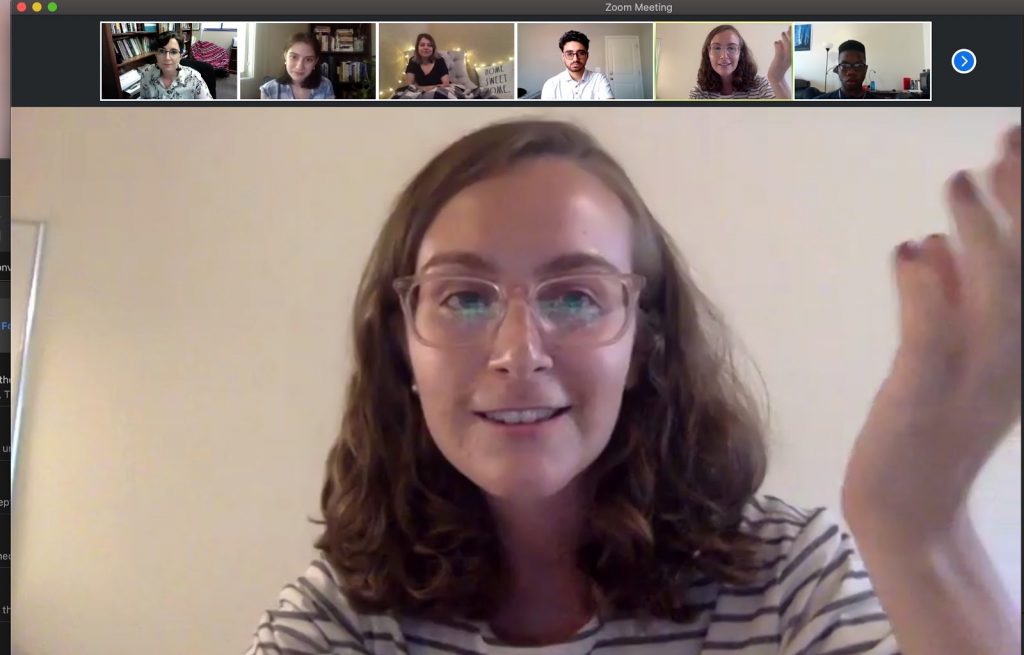Contributors
SMBHC Creates Resources for First-Generation Students
The SMBHC First-Generation Student Network hosted Makayla Haussler virtually on September 9th as the first speaker in its fall speaker series.

By: Julia James

The SMBHC First-Generation Student Network hosted Makayla Haussler virtually on September 9th as the first speaker in its fall speaker series. Haussler discussed the experience of applying to nationally competitive scholarships as a first-generation, low-income student and provided advice to students currently applying and those considering applying.
“People shouldn’t take themselves out of the running of these kinds of awards if it’s an opportunity you think you might be interested in,” Haussler said. “Even if you have insecurities about your qualifications, you don’t know whether you would be able to win the award unless you actually apply for the award.”
Haussler was a first-generation, low-income student at Yale when she received the Truman and Mitchell scholarships, which allowed her to receive her MA in Gender Studies at University College Dublin. Haussler now lives in Oxford, UK and works as a Legal Analyst for McAllister Olivarius, an international feminist law firm.
In the presentation and discussion, Haussler covered topics such as how to prepare for an interview, how much of one’s personal background to share in an application, deciding what to get involved in, handling failure, and building relationships with mentors.
“[The opportunity to give a talk] appealed to me because as I first-gen student, I knew it would have been helpful to hear things like this before I got to the point where someone from the fellowships office was saying ‘now that you are in serious contention for this scholarship…’” Haussler said.
“It’s particularly empowering to get a perspective of what it’s like to be out on the other side of applying for these national scholarships and being successful, particularly when that experience comes from a background that’s not highly represented in these spaces,” said Andy Flores, a first generation student from Ocean Springs, MS.
“The network came out of my own struggle as a first-gen student in the Honors College,” said Ainsley Ash, the founder and president of the SMBHC First-Generation Student Network. Ash wanted to create a space to discuss common obstacles and share resources with other first-gen students, and was encouraged and supported in this effort by Senior Barksdale Fellow Ashleen Williams. Together, they began holding interest meetings in the Fall of 2019 that resulted in the creation of the SMBHC First-Generation Student Network.
Ash also stated that the network intended to unmask parts of the hidden curriculum, which she defined as, “an unspoken language to how students are evaluated and expected to behave that falls along traditionally white and middle-class lines.” She further elaborated things like attending office hours may not be formally mandatory, but are “key to developing relationships with professors which is social capital which translates later to letters of recommendation which get you jobs that turn into economic capital.”
The Network addresses a broad variety of issues first-generation students experience, including accessing university resources, applying for internships and national scholarships, and preparing to return home for the holidays.
Ash said she struggled with disappointment when she returned home because her family wouldn’t understand the challenges and excitements of her classes or her plans for the future. Common struggles like these sometimes became bonding points for first-generation students.
“Ainsley recognized that I was having a rough time with my transition to college, and she showed me a lot of different resources and was very compassionate with what I was going through because she could empathize,” Flores said.
Flores says that in the future, he hopes the University makes resources more transparent to students that they otherwise may not find. He also advocates for an orientation session hosted by current first-gen students that could address questions about campus resources and acknowledge the struggle of first-generation students earlier on.
Ash believes that resources should be directly funneled into offering more scholarships and need-based aid and deliberately promoting those resources to the students most likely to need them. She said that she would also like to see a first-generation curriculum implemented. The Center for Student Success and First Year Experience offers one section of EDHE targeted towards first-generation students, but Ash believes this should be expanded.
The director of StudentsFIRST, the first-generation support program within the CSSFYE, was unavailable for comment. In the 2014-2015 academic year, first-generation students made up 11% of the freshman class according to enrollment data.










































